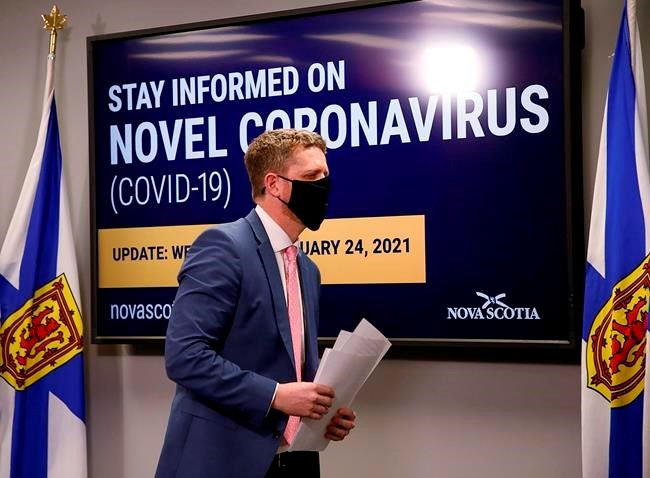HALIFAX — With Atlantic Canada's worst COVID-19 outbreak showing no signs of letting up, Nova Scotia's premier warned Thursday he might impose tougher restrictions to reduce the rapid spread of the deadly virus.
Premier Iain Rankin told a virtual news conference he has grown frustrated with residents and visitors who aren't taking the pandemic seriously, despite the fact the number of active cases has jumped from 111 two weeks ago to 1,309 on Thursday.
"I don't know what more I could say to Nova Scotians to make sure they take this issue seriously," he said after a cabinet meeting. "If … public health (officials) have other restrictions that they think will help, I won't hesitate to put them in."
Health officials reported 182 new cases of COVID-19 on Thursday — another record daily high. They said 45 people were in hospital with the disease, including nine in intensive care.
Continuing a trend that started a month ago, almost all of the new cases — 155 — were reported in the province's central zone, which includes Halifax.
"It's widespread in the Halifax area," Dr. Robert Strang, Nova Scotia's chief medical officer of health, said in a statement.
Earlier this week, Nova Scotia marked a dubious milestone when its per capita rate of active infections eclipsed that of Quebec for the first time. According to Ottawa's daily online epidemiology update, Nova Scotia's infection rate as of Wednesday was 123 cases per 100,000 people and Quebec's stood at 104 per 100,000.
Aside from the other Atlantic provinces and the territories, Quebec's per capita active infection rate is now the lowest in Canada.
In Halifax, Rankin said the restrictions imposed last week when the province went into a two-week lockdown were harsher than the measures taken during the first wave of the pandemic last year.
On April 27, the province ordered the closure of schools, malls, gyms, bars, restaurants and most retail stores — and it closed its borders to all non-essential travel.
Rankin also doubled the maximum fine for those caught violating the province's public health rules, which include a ban on travel between municipalities. "People need to co-operate for those restrictions to work," the premier said, adding that the coming weekend could prove to be a turning point.
"I know that Mother's Day is this Sunday, and I know that's going to be difficult. But people, please stay home. Use your virtual apps to say hello, or your phones."
Police in two Nova Scotia communities confirmed Thursday they had laid charges in connection with COVID-19 restrictions.
In New Glasgow, N.S., police said a 32-year-old driver on his way to New Brunswick was charged under the Emergency Management Act for travelling for non-essential business and for leaving his home municipality.
And in Cape Breton, police charged a 56-year-old New Waterford, N.S., man Wednesday for violating a provision of the Health Protection Act that says anyone arriving from outside Nova Scotia, P.E.I. or Newfoundland and Labrador must self-isolate for 14 days.
He was handed a $2,000 fine.
Asked if the latest Nova Scotia outbreak could be linked to the province's decision last month to loosen restrictions, Rankin said that wasn't the case. The premier said the sudden surge was the result of people coming to the province from outside Atlantic Canada and ignoring the 14-day isolation requirements.
"I can't help it if people don't listen to the 14-day isolation, which is why we went further this time, and we actually closed the borders down," he said. "We're going to continue to turn people away unless they have an essential reason to come here."
Meanwhile, Nova Scotia Health Minister Zach Churchill said his department and the various health authorities are working on a worst-case-scenario plan.
"We're seeing a high level of hospitalization with this third wave," he told the news conference. "Younger, healthier people are being hospitalized … at a higher rate than the first two waves."
Churchill said the province's health-care system can withstand the surge in cases, based on the latest computer modelling and accounting for the cancellation of elective procedures.
This report by The Canadian Press was first published May 6, 2021.
Michael MacDonald, The Canadian Press



